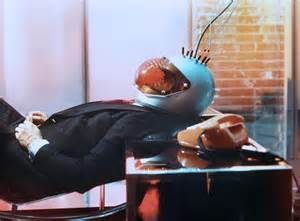Welt
am Draht
World
on a Wire

The director’s
“echo” of Godard’s Alphaville
and something of a magnum opus in its own right.
A
reading of the film in color, “a reproduction in miniature of our society...
a tiny universe identical to ours.”
The Third Man (dir. Carol Reed), “it has to look like an accident so the other
units don’t suspect.” The vanishing act of 1984, public and private.
“I think,
therefore I am. Right?” Contingencies of the
real (cf. Fleischer’s Soylent Green). “Siskins
must be a bigger gangster than I thought.”
Delusion? “That’s a good name for the baby”
(auf Englisch),
cf. Kubrick’s 2001: A Space Odyssey, Krish’s Unearthly
Stranger.
A.O.
Scott of the New York Times, “too
slow and diffuse to count as a lost masterpiece.” Roger Ebert (Chicago
Sun-Times), “I don't believe we're expected to be shocked by that
possibility... I'm not convinced Fassbinder really
cared.” J. Hoberman (Village Voice), “a bit of a slog”. Joshua Rothkopf (Time Out),
“the discovery of the season.” Jason Buchanan (All Movie Guide), “mind-bending”.
Angst essen Seele auf
There is a
complicated little setup to this love story, and Fassbinder’s handling of
it is half the style. Deutschland, whatever it is, is all in the hands
of a widowed middle-aged cleaning lady. Her husband was a Polish laborer during
the war, they both were Nazis, “everyone was, or nearly.” She meets
a Moroccan guest worker younger than herself, they fall in love and marry.
The
gag material around this is most impressive and drily delivered. The Arabs in
Munich keep to themselves after the PLO catastrophe, she takes him for their
wedding dinner to an Italian restaurant favored by Hitler before he became
Chancellor, “I’ve always wanted to eat here.” It’s
expensive.
It’s
Fassbinder’s Othello, rationalized beyond reckoning so as to be
almost unrecognizable. Perfectly filmed in formal shots setting off the
detailed color cinematography.
Despair
Behind Hermann
Hermann is a Russia “lost”, before him in his adopted country is
the rise of Fascism. It’s 1930 and so on, Wall Street’s collapse
impinges on his chocolate factory. His wife is unfaithful with a bohemian
artist cousin.
Hermann tries to
do a murder, a merger, but the bankrupt chocolate maker tells him, “keep
your fucking shekels.”
Hermann finds a
sort of human road apple and kills him attired as himself, to collect the life
insurance and live with the wife somewhere else, Switzerland, far from the
cousin and the rest.
The police
aren’t fooled, there is no resemblance between the dead man and the
passport photo in his pocket.
The direction is
especially remarkable for its striking period representation freshly
contemporary. Bogarde’s evocation of a Nabokovian character begins with
an aural impression of the author. Stoppard’s screenplay is typically
lucid, a sort of running telegraphy sent among the orchestral dimensions of the
filming to bear the straight line with no fuss, but with several amusements
along the way.
Die Ehe der
Maria Braun
The pornocracy (Metropolis).
Die Sehnsucht der Veronika Voss
The pornocracy (Sunset
Boulevard, The Long Goodbye).
Lola
The pornocracy (Le
Mani sulla cittą, Der blaue Engel).